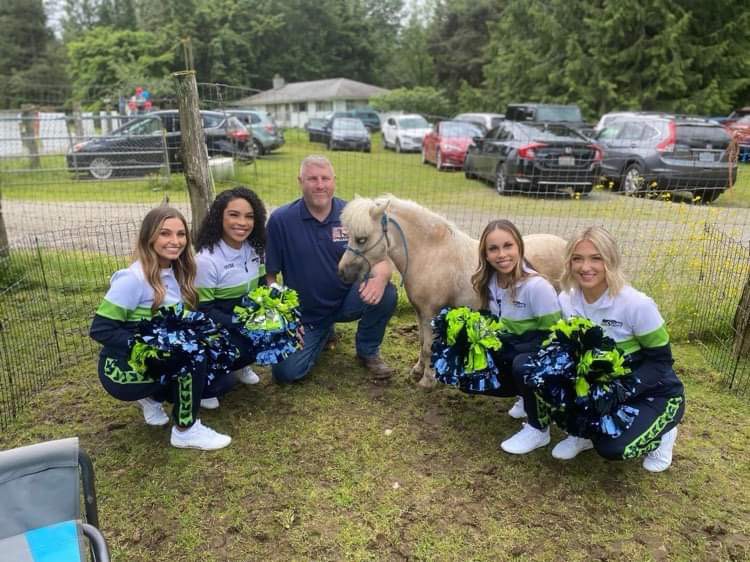You may have seen Apollo while out shopping or at a community event – he’s been in the Lacey Lighted Parade – with his handler, Matt Wagner. It’s pretty hard to miss a miniature horse inside Fred Meyer! But Apollo the Service Mini isn’t just a pet, he’s Matt’s service animal and performs important duties for the retired army veteran.
After 22 years, Matt was medically retired from the army in 2015. “While still on active duty, Matt had worked with an equine therapy program, where he learned a lot about horsemanship and the healing power of horses,” shares Chantell, Matt’s wife. “I also volunteered with that program and worked with a miniature horse there and started researching miniature horses. In that research, I discovered that miniature horses are the only animal other than dogs that are allowed to be service animals per the ADA.”
Matt needs a service animal that can help with anxiety, PTSD and balance issues. Many people had suggested a service dog to him, but he didn’t like the idea of having to start over about every 7 years – the average working life of a service dog. “One of the main reasons why we decided on a mini was their lifespan,” explains Chantell. “In the lifespan of one mini, a handler could go through up to six dogs. Also, Matt has a bad back and some balance issues, at Matt’s size there really isn’t a dog that can give him the balance support when he needs it, and even if you found a bigger dog, you have a shorter lifespan, which goes back to our main reason for a horse.”
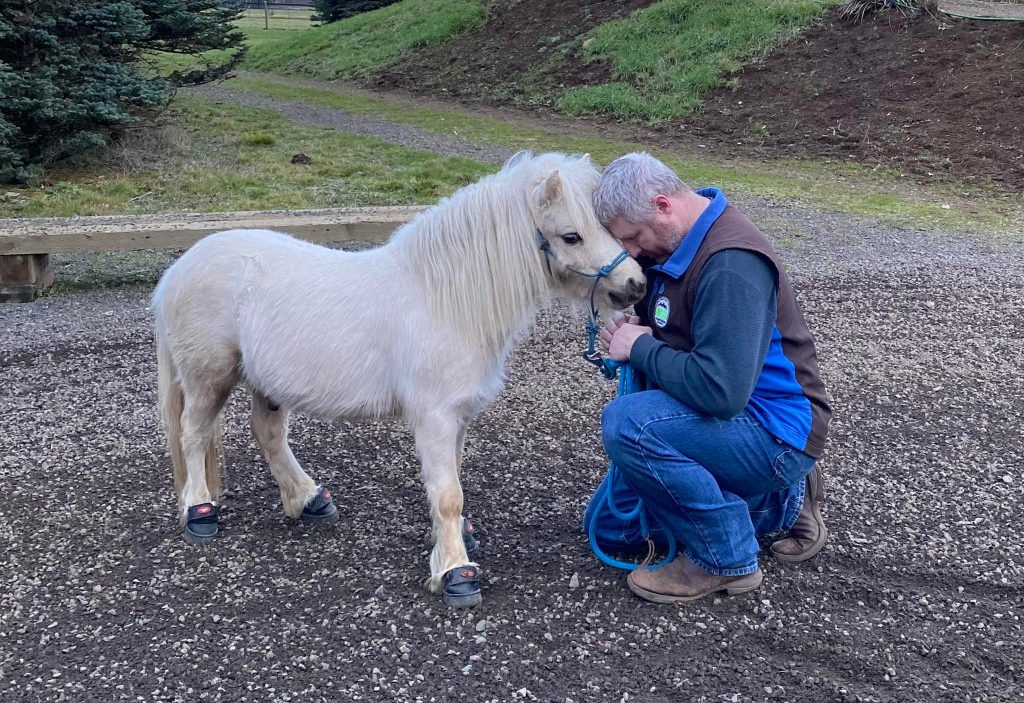
Finding a Miniature Horse Service Animal
Chantell shares Matt was still a bit skeptical about the idea, however, and set some pretty high parameters on a miniature horse. “He set me out in search of a unicorn,” Chantell says. He wanted a palomino miniature horse, which is not a color prevalent in minis. But fate had plans. The day Chantell started to look for a mini she found a palomino gelding that had been working as a therapy horse, visiting hospitals, as well as working in a petting zoo. “He was already fully desensitized, and potty trained, basically all he needed was individualized task training for Matt’s specific disabilities, and he was even in Olympia,” shares Chantell. “The ad had been up for less than 24 hours. That night we went to meet Dale – now Apollo – and he and Matt instantly connected. The woman selling him said she just wanted to find a home where his training would be utilized, we told her we wanted to use him as a service animal for a disabled veteran and the rest is history.”
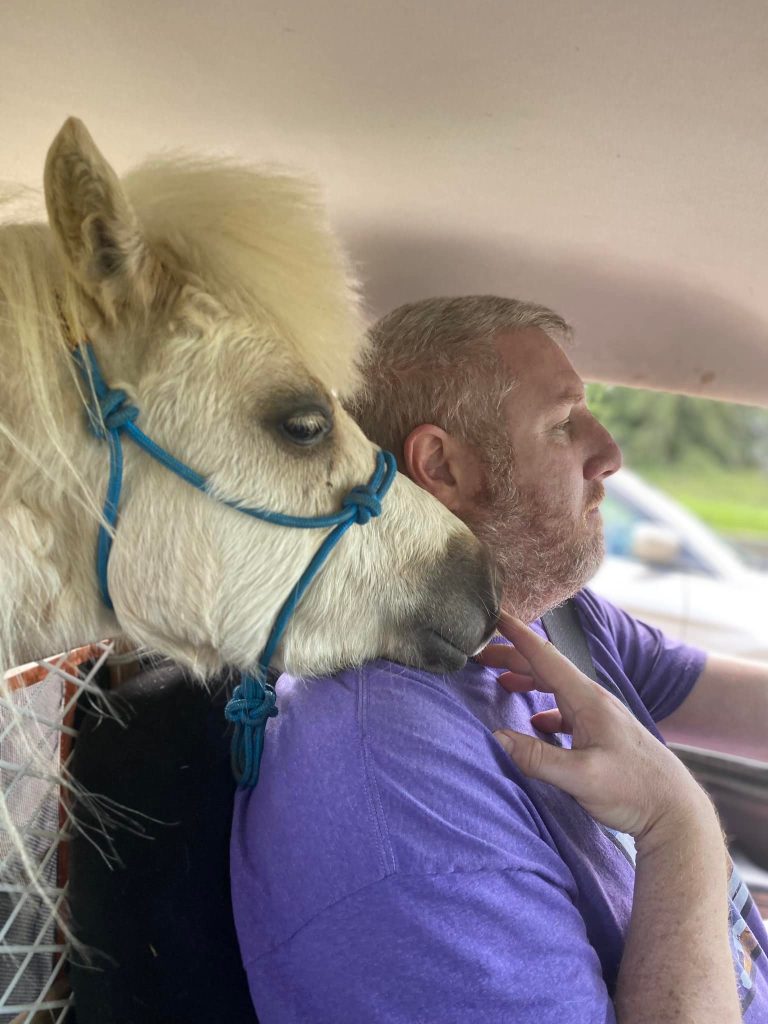
Becoming Apollo the Service Mini
Apollo still had some training to do before he could be Matt’s service animal. Both Matt and Chantell think it’s important for people to know what is and what isn’t legit when it comes to service animals. “First, and most important, there is no actual legal ‘certification’ for service animals, dogs or horses,” explains Matt. “There are websites out there that will sell you registrations and certifications, but they are pretty much scams. To require certification would create a barrier to a form of medical assistance, that has been deemed necessary by a medical professional.”
In addition, businesses can only ask what duties Apollo – or any service animal – provides. Nothing more. The legal answer, as Matt and Chantell put it, is that he performs alert, mobility and redirection tasks. “That is all that a handler is legally required to answer to that question, businesses are not allowed to ask for medical specifics or ask for a handler to demonstrate trained tasks,” adds Matt. “A handler can always choose to volunteer more information but is not required to do so.”
In order to be a service animal, the ADA requires miniature horses to be potty trained and task trained for at least one active task that their handler needs. “Being very desensitized to various sights, sounds and smells is also very important for both therapy and service minis,” adds Chantell.
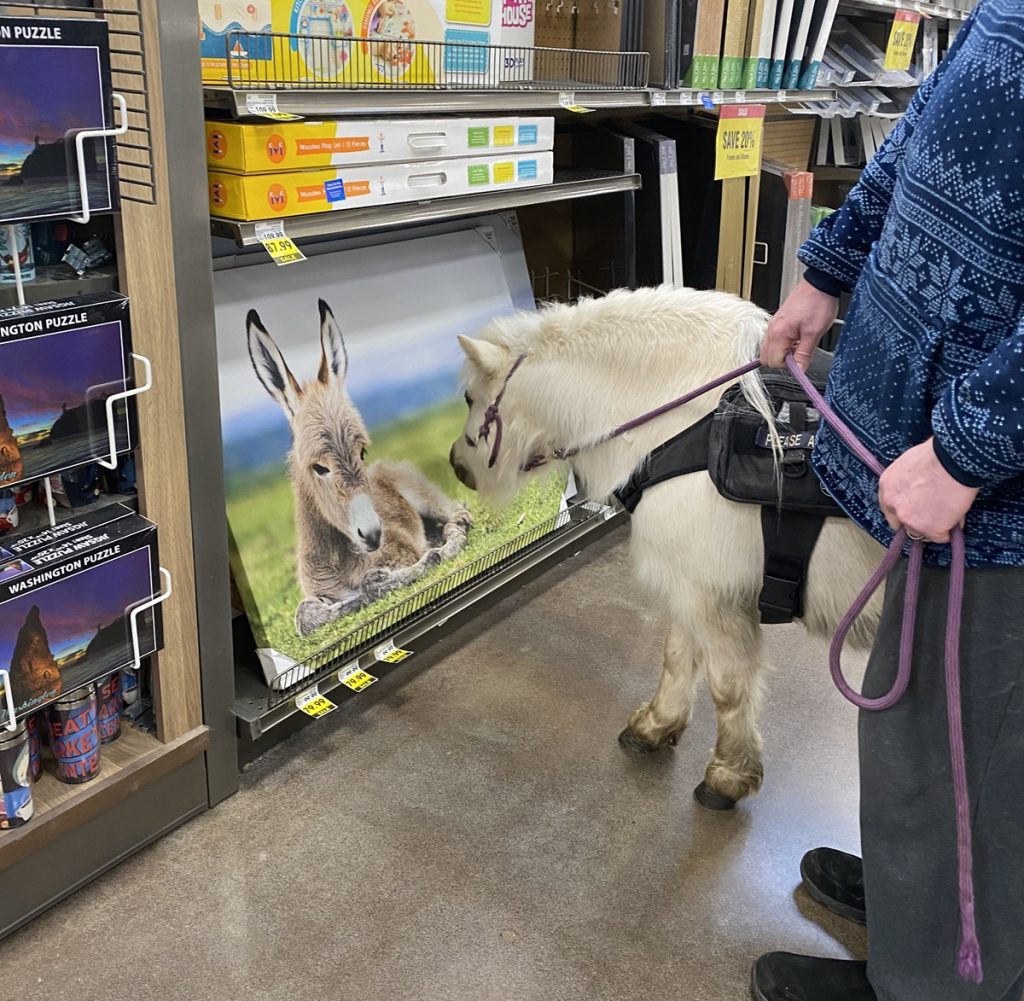
Apollo has a few jobs as Matt’s service animal. “Apollo’s Alert tasks include alerting me to high blood pressure or increased heart rate, due to high levels of stress, anxiety, or PTSD triggers,” explains Matt. “His mobility tasks include providing support when I need assistance getting up from the ground, and providing balance support when needed for bouts of vertigo. Redirection tasks include making me focus on him rather than external triggers or stressful situations. This goes hand-in-hand with the alert tasks, as sometimes I only need an alert to realize what’s going on, and sometimes I need his assistance in redirecting my attention.”
For the most part, Matt says people are excited and welcoming of him and Apollo. “Every once in a while, I get someone who tests me to see if I know my rights, but not terribly often,” he shares.
Helping End Veteran Suicide
Apollo the Service Mini has his own Facebook page and website, where he helps spread the word about miniature horses as service animals, but it’s also a platform for something Matt and Chantell are very passionate about – ending veteran suicide. Twenty-two veterans take their own life every day, Chantell says. “Everywhere we go Apollo seems to get lots of attention,” explains Matt. “We try to focus that attention on finding those folks that are having a difficult time, and connecting them to things that might help. If walking through a grocery store leads to a conversation, and that leads to someone getting help from one of the programs on his website, that’s a win every time. If we can help someone find any other answer than becoming one of the 22 a day, that’s great. Most folks suffering from anxiety, depression, PTSD or other conditions don’t want to die, they just don’t see any alternative solutions that will end their suffering.”
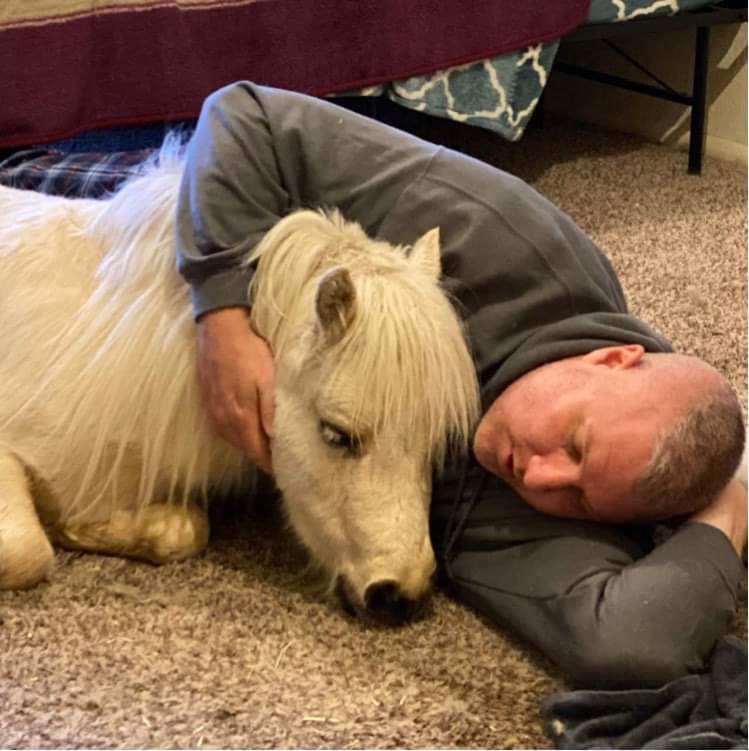
Apollo has helped other people in his life as Matt’s service animal. Chantell had a military spouse reach out to her because her husband was having a bad time after the loss of his service dog triggered even worse PTSD symptoms. “She went back to her husband and told him about this crazy veteran in Washington and his amazing little horse, and last we heard they were looking for a mini in training to be her husband’s service animal,” says Matt.
And once in Walmart, Apollo helped a woman having a panic attack. “They found a safe place to sit down in the middle of Walmart, where she could breathe and relax, with Apollo’s head in her lap, and talk, they sat there for at least an hour, but with the help of Apollo, she was able to work through her panic attack and left relaxed happy and smiling,” shares Chantell, “which made both Matt and Apollo quite happy as well. A few weeks later we ran into her at Walmart again, and she was so excited that she was able to introduce her husband, who was home on military leave, to the little horse that had helped her so much that day.”
To learn more about Apollo, visit his website and Facebook page.
